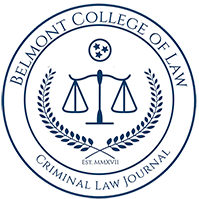State of Tennessee v. Quinton Devon Perry, No. W2019-01553-SC-R11-CD (April 5, 2022).
Written By: Alex Redmond, Associate Editor
In June 2019, Quinton Devon Perry (“Defendant”) pleaded guilty to twenty-four counts of aggravated sexual exploitation of a minor. The Defendant was found to have uploaded 174 images and videos, containing child pornography, to his personal Dropbox account.
The Defendant’s first six counts were classified as Class B felonies and the remaining counts were classified as Class C felonies. After the Defendant entered his guilty plea, the State filed a motion asking the trial court to impose consecutive sentences upon the Defendant under Tennessee Code Annotated § 40-35-115(b)(2). § 40-35-115(b)(2) gives the trial court discretion to impose a consecutive sentence where the Defendant is found to have a record of criminal activity that is extensive.
The trial court sentenced the Defendant to nine years of imprisonment for each of his Class B felonies and to four years for each of his Class C felonies. The trial court then concluded that the Defendant was an offender whose record of criminal activity was extensive and ordered that counts one through three be served concurrently, but that counts four through twenty-four be served consecutively. The trial court cited the large amount of child pornographic images involved, the Defendant’s admission of a serious child pornography problem, and the fact that the Defendant shared the images with others as key facts that led to its conclusion that the Defendant satisfied § 40-35-115(b)(2).
The total sentence to be served by the Defendant was 18 years. The Defendant appealed to the Tennessee Court of Criminal Appeals, challenging the length of his individual sentences and the trial court’s imposition of consecutive sentences. The Tennessee Court of Criminal Appeals affirmed both aspects of the trial court’s sentence. The Defendant appealed to the Tennessee Supreme Court, solely challenging the trial court’s imposition of a partially consecutive sentence.
The legal issue, in this case, was whether the trial court erred in finding that the Defendant was an offender whose record of criminal activity was extensive, pursuant to Tennessee Code Annotated § 40-35-115(b)(2), and thus erred in its decision to impose a partially consecutive sentence upon the Defendant.
Ultimately, the Court held that no, the trial court did not err in its finding that the Defendant was an offender whose record of criminal activity was extensive and, therefore, did not err in imposing a partially consecutive sentence.
In an appellate court’s review of a trial court’s consecutive sentence determination, the abuse of discretion standard, accompanied by a presumption of reasonableness, applies. State v. Pollard, 432 S.W.3d 851, 861-62 (Tenn. 2013). Here, the Defendant argued that the fact that he was convicted of twenty-four offenses, alone, was not a sufficient basis for the trial court’s conclusion that he had an extensive record of criminal activity. This is because the number of convictions was “solely a function of the nature in which the sexual exploitation statute allowed the State to indict.” The Court first recognized that “extensive” criminal activity under § 40-35-115(b)(2) was not self-defining or defined within the Sentencing Act. Thus, the Court construed its meaning by looking to authoritative dictionaries. Using those authoritative dictionaries, the Court concluded that an extensive record of criminal activity is “that which is considerable or large in amount, time, space, or scope.” The Court then disagreed with the Defendant’s view that the trial court only relied on the number of the Defendant’s convictions to find that the Defendant satisfied § 40-35-115(b)(2). The Court pointed to the trial court’s consideration of (1) the number of images the Defendant downloaded and (2) the fact that the Defendant shared those images with others. Those facts, which the trial court stated on the record, properly supported its finding that the Defendant was eligible for consecutive sentencing under § 40-35-115(b)(2) because those facts related to the amount and scope of the Defendant’s criminal activity.
The trial court’s failure to specifically address the temporal nature of the offenses, or the time span in which the Defendant spent committing the offenses, did not negate the presumption of reasonableness for the court’s sentencing decision. Because the trial court’s findings were sufficient to receive the presumption of reasonableness, it had to be upheld unless there was an abuse of discretion. A trial court abuses its discretion when it causes injustice to the challenging party by “(1) applying the incorrect legal standard, (2) reaching an illogical or unreasonable decision, or (3) basing its decision on a clearly erroneous assessment of the evidence.” Harmon v. Hickman Cmty v. Healthcare Servs., Inc., 594 S.W.3d 297, 305 (Tenn. 2020). In this case, the Court found that the Defendant failed to show that the trial court abused its discretion.
In this opinion, the Court took the opportunity to name several non-exhaustive factors for trial courts to utilize in determining whether a defendant’s record of criminal activity is extensive within the meaning of § 40-35-115(b)(2). In other words, whether the record of criminal activity is “considerable or large in amount, time, space, or scope.” Those factors include (1) The amount of criminal activity, often the number of convictions, both currently before the trial court for sentencing and prior convictions or activity; (2) the time span over which the criminal activity occurred; (3) the frequency of criminal activity within that time span; (4) the geographic span over which the criminal activity occurred; (5) multiplicity of victims of the criminal activity; and (6) any other fact about the defendant or circumstance surrounding the criminal activity or convictions, present or prior, that informs the determination of whether an offender’s record of criminal activity was considerable or large in amount, time, space, or scope. The Court also clarifies that a defendant does not need to have prior criminal convictions or activities to be considered an offender under § 40-35-115(b)(2).
